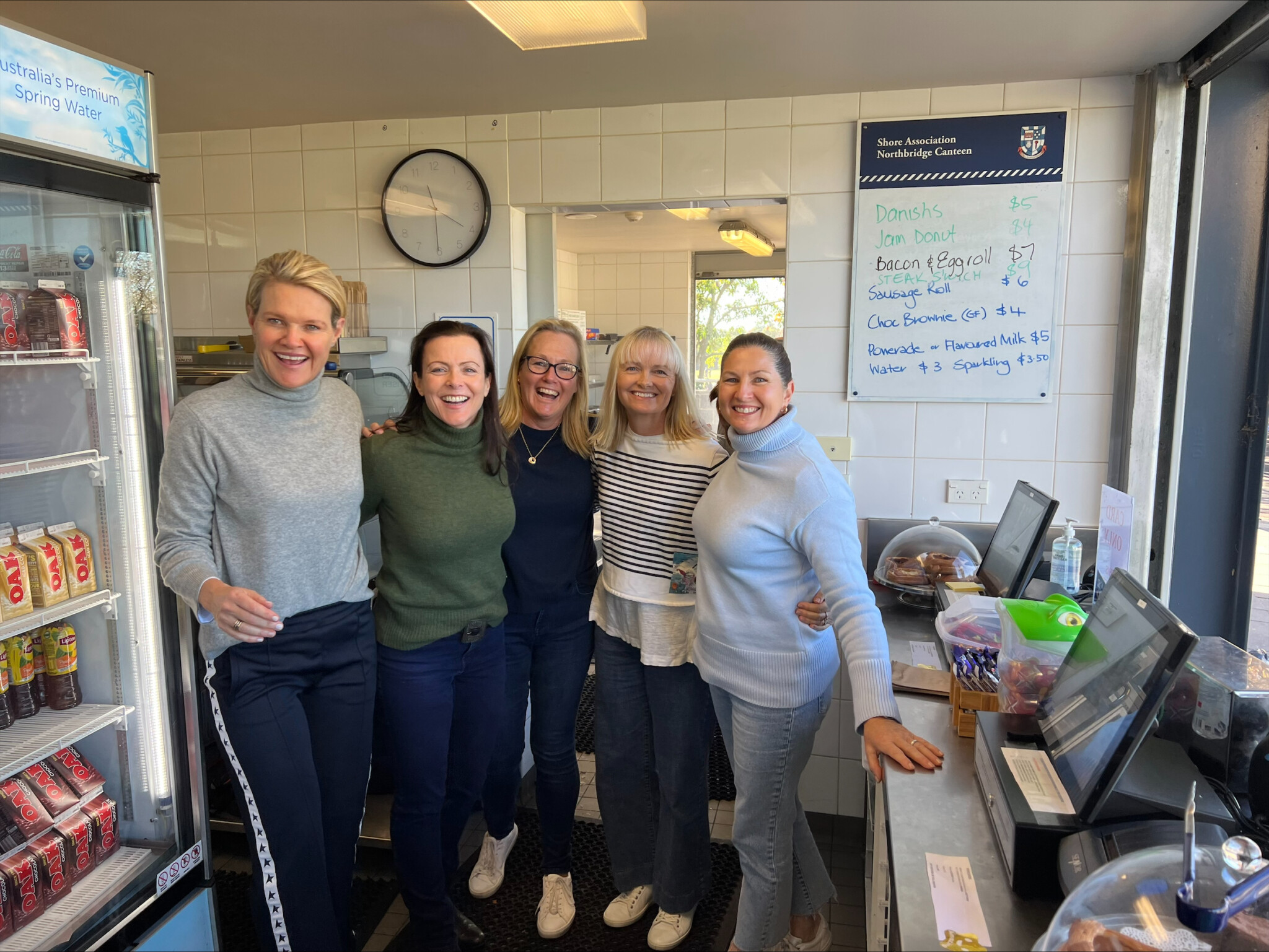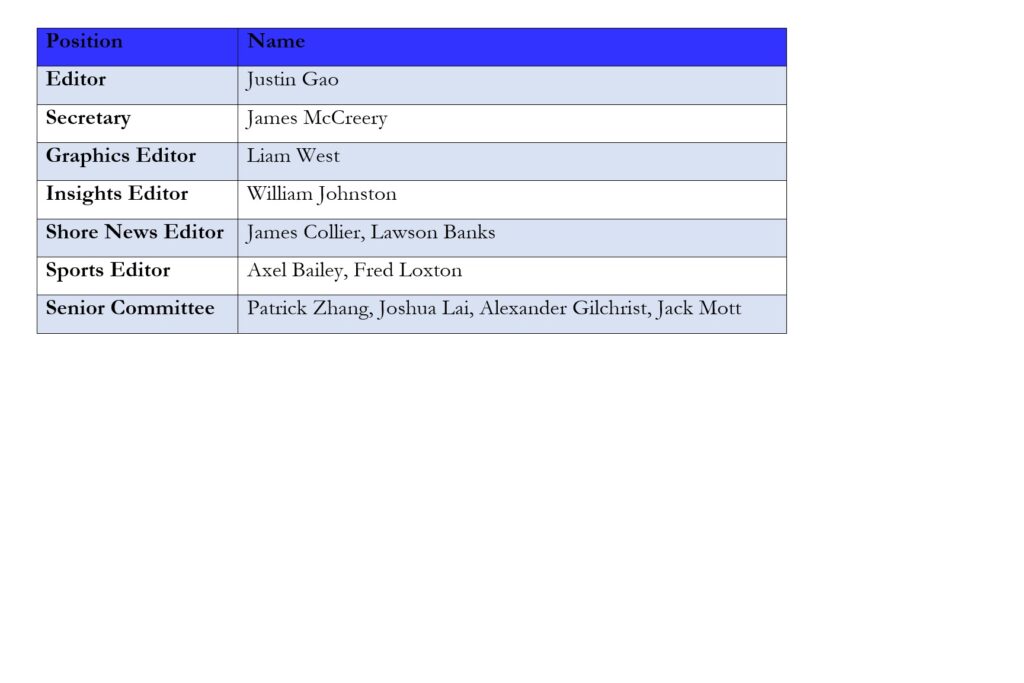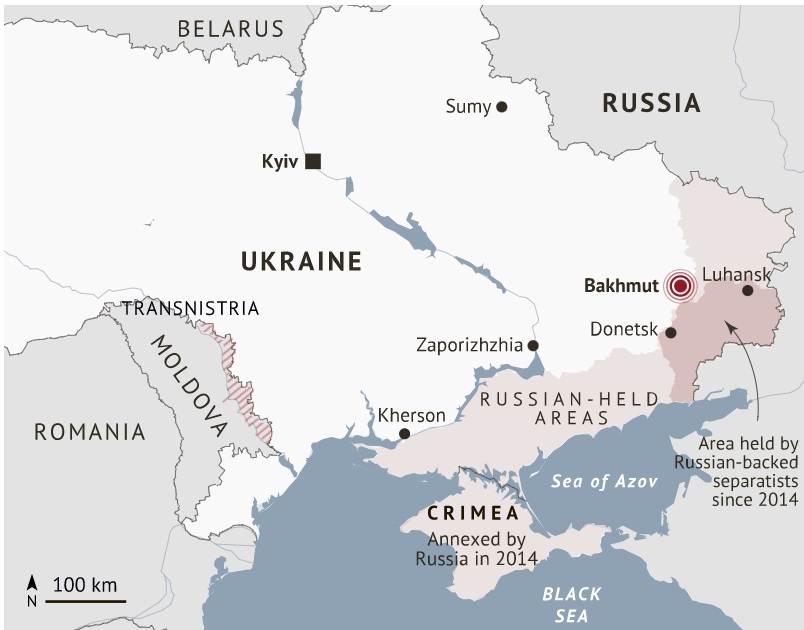Neuroscience and the Christian Narrative
Consciousness, Gut Feeling, Neural Networking
J. Y. Gao
The following two articles represent the individual opinion of two Senior students at Shore School. Both articles explore ideas of faith and we would like to acknowledge that their articles represent their personal opinion and not necessarily the views of the whole Shore School Community.
CHRISTIANITY IS OFTEN DESCRIBED AS A VISCERAL EXPERIENCE. It is common to hear believers describe Christianity as something that makes sense; something that explains the chaos and injustice of this world, something that aligns with an innate ‘gut feeling’. You, perhaps, are one of billions of people who believe in Christianity. This article is a discussion of my own view on the Christian narrative – it is one that is more nihilistic than a religious ontology, yet, for me, it feels more freeing.
My view on religion, currently, is that it is a construct which assists humans in our eternal existential search. In order to prove this, we must recognise the act of following Christianity as a dichotomy consisting of subconscious ‘feeling’ and conscious choice. For Christianity, this subconscious ‘feeling’ that there is greater meaning is God-given, and our conscious choice is between accepting and rejecting God’s love and this subconscious ‘feeling’. Logically, if this conscious choice does not exist, then we can no longer attribute this ‘feeling’ as God-given, and therefore must attribute it to biology/evolution purely. Therefore, to me, a lack of free will proves the fallibility of the conscious-subconscious Christian dichotomy, leading to the revealing of evolutionary factors as the only reason for our innate need for meaning.
In my opinion, consciousness leaves no place for freewill.
What is the defining feature of consciousness? How can we define consciousness?
For me, consciousness is the capacity to reflect. Within the word reflecting, two actions are implied. 1) Recall, 2) evaluation. This definition of consciousness works well. The three core tenants of consciousness –
1.attention (our ability to focus on a particular event)
2.perception (our awareness of the sensory information we receive)
3.reasoning – all fit into this definition of reflection.
– all require recalling memory from various regions of the brain, all three require an evaluation/decision that catalyses an action.
So, of the two actions implied through reflection (recall, evaluation), it is obvious that the first (recall) does not require any freewill.
When sensory information is received, say, from the eyes, electric signals are transported to the brain via the optic nerve. More advanced than computers, which transmit ‘information’ by on or off (1 or 0), nerves can transmit ‘information’ through the path they took, the strength of each synaptic transmission, and the number of synaptic transmissions within the neighbouring region of neurons. Every detail your eyes pick up causes electrical/chemical signals of varying speeds and strengths to occur, which in turn affects the number of neurons involved, the path taken, and other factors. A certain set of stimuli, like the colour brown, sets off a specific chain of neurons. These reactions, like never-ending dominos, keep catalysing different events in the brain, some of which will reach the hippocampus. This chain reaction will cause activation and strengthening of certain groups’ synaptic connections in a process called long-term potentiation (LTP). The strengthened connections between neurons within this specific group form an overall pattern of neural activity within that group, and that very specific pattern corresponds to the information received. Colour, as well as other relevant information on location has thus been ‘integrated’, and has become part of your episodic memory.
When a reflection is necessary, the sensory information that catalysed the ‘reflection chain’ reaches the Prefrontal Cortex (PFC), which will cause a cue to the appropriate memory region that reactivates the pattern of neural activity associated with the memory. Up to this point, there has been no room for any decision-making opportunities for the individual. This entire process has been described through a long chain of reactions.
And now, we reach the point where we must evaluate. An evaluation consists of
1) The generation of potential outcomes
2) the assignment of value to each outcome.
1) Generating potential outcomes
A potential outcome – a specific pattern of neural activation and connectivity – is caused by stimulation of the senses that communicates a need for a decision to be made. For example, the choice to buy an apple or not is constructed of sensory information that describes the apple, as well as the memories associated with apples and decision-making. This ‘need for a decision’ causes the signals to travel from the PFC to certain regions of memory and reactivate certain patterns of neural activity, which in turn correspond with a specific response within the PFC that we understand as working memory. Working memory is used in cases such as this when the PFC needs to compare two options/memories.
2) Assigning value to outcomes
The reactivation of these memories, and their placement and structure within the PFC (as working memory), causes further reactivation in memory (such as personal goals) as well as other regions such as the amygdala, insula and anterior cingulate cortex (AIA – all of which are largely responsible for subconscious, emotional responses). The reactions from other regions rebound back to the PFC, where the option that fire’s strongest causes an action to take place. Some factors that contribute to the strength of firing include the release of neural modulators like dopamine or serotonin by the AIA, which inhibit, to various extents, the ability for neurons to communicate. This action may be external, where the physical body is required to move, or internal, where the favourable option is stored into memory. This process happens almost instantaneously and over thousands of different neural connections.
From here, I think it is appropriate to assume that the option with the greatest net reaction will always be the ‘decision’ that is chosen. What this conclusion implies is that every decision that you make is predetermined, and that freewill is a mere illusion. Again, in the context of real life examples, this makes sense.
Everytime you make a decision, you will always pick the favourable option. You could refute this by saying there are cases where a person picks the unfavourable option – an expression of freewill. Yet, when taking a closer look, out of the two options, which were REALLY the favourable and unfavourable options. By virtue of picking what had seemed to be the ‘unfavourable’ option, you have deemed it favourable over the other option.
As a result, when it comes to the Christian dichotomy, the conscious choice to accept or reject God’s love seems non-existent. Consequently, the narrative of a subconscious ‘feeling’ or a higher degree of being that granted us freewill also seems to lack legitimacy.
Therefore, for me, the innate need to find meaning or search for an objective reality looks to be entirely a result of biological evolution, residing in the physical structure and mechanisms of the brain.
Of course, neuroscience is still a fast-developing area of research, and the instruments of our current time are incapable of measuring and storing the data of a comprehensive model of the brain. Potentially, quantum physics may play a part in cognitive processing as it is an area of study that has repeatedly validated the probabilistic qualities of reality on a quantum level. This could provide room for freewill – room for God to operate. Though as of now, it seems to me the processes most associated with freewill, like decision making, are mere collections of immensely complex chemical reactions.
RE: Neuroscience and the Christian Narrative
Subconsciousness, Intuition, Deconvolutional Networking
J. M. Cochrane
FREE WILL IS A TOUGH CONCEPT. SO TOUGH, THAT PHILOSOPHERS FOR WELL OVER 2000 YEARS HAVE GRAPPLED AND DEBATED THE SAME DICHOTOMY OF CONSCIOUS CHOICE AND DETERMINISM AS WE DO TODAY. Knowingly or not, we all have stumbled across some of these ideas at some point in our lives as your perspective on libertarianism (fancy word for complete free will) determines how you perceive morality, justice, rationality, love, questioning everything that makes you human, that is separate from just random molecules in space.
Under a Christian lens however, I take great comfort from knowing that 1000 years before I even started writing this, tens of thousands of great Christians have debated and discussed these very ideas, and yet they still return to the gospel. Despite individual’s having conflicting evidence and perceptions on these issues, even when faced with the supposed paradox of a free vs determined debate, the argument for Christianity comes out unscathed and perhaps even stronger.
It’s important to establish that the term ‘free will’ varies. Libertarian free will at its most basic is the belief that humans are capable of making some actions freely. Some even go as far as to argue that we are the sole arbiter of our decisions and that no outside external factors have any ultimate influence.
Simply put, I chose to do it, because I felt like it and not necessarily for any other reason.
Determinism on the other hand, is the belief that all events are caused by past events such that nothing other than what does occur could ever occur. This means that every decision you have ever made is just the natural result of cause and effect and any ‘choice’ we make is just the predestined outcome of a number of subconscious factors.
The Problem with Determinism without a God
When we look solely on science, and neglect the existence of a higher being, and reduce the notion of free will down to just cause and effect, it’s easy to come to the misunderstanding that you and I and everyone around us are just atoms in a purely physical state and therefore subject to natural physical forces. And this makes some logical sense, our brains are, after all, just made up of material objects and chemicals.
However, if hard determinism is true, and there is no God, it implies devastating implications for how we perceive ourselves and others. Individual freedom is the crux of our societies, justice systems, relationships and without agency, we lose what it means to be human. For instance, without free choice, we lose moral and judicial responsibility. A criminal could argue that they had no control or will over their own actions and therefore it could be considered unjust for punishing someone for something they had no control over.
We also give up the concept of rationality, which is a key in separating us from animals, as rationality implies the ability to look at a range of evidence and logically decide on the best outcome. Without an element of free choice, we lose human reasoning. Even if I could prove determinism is true, it would not necessarily be true; rather it was just the inevitable conclusion of neurons in my brain. I can give you an answer, but it has no value because it was not created from rational thought.
Ultimately, be it real or not, it is undeniable that we all experience some sense of the phenomenon of ‘freedom’. That is to say, it “feels” like we have control. Whilst humans do exist in a physical world, if there is not a God, I would argue that there are too many fundamental issues with determinism and humanity, insisting that without freedom we just become pre programmed robots. In short, when we approach this question without ultimately considering God, both determinism and free will fall apart.
How the gospel still makes sense
Whilst many would agree with elements of both libertarianism and determinism, ultimately this seems to have major problems as rationally, it seems like both ideas cannot co-exist.
And for Christians, this has important implications for how we interpret the bible, especially considering tricky topics like predestination. The basic and seemingly “paradoxical” situation is that there needs to be an element of freedom in our choice to accept God’s love (so that it is a genuine relationship), but simultaneously God has a predestined plan for your life, including whether or not you will become a follower of Christ.
How is it that God can have both “predestined” who he chose to be saved, and at the same time, God provides us with the “free” choice to accept him or reject him?
Yet, thousands of years of debate has demonstrated that these discussions do NOT actually determine if Christianity is true or not. That is to say, the argument of hard determinism, even if it is true, does not disprove or take away from Christianity. Many famous Christians have argued that our reality allows for agency and freedom whilst many argue otherwise, yet all of them come away with a stronger understanding of the gospel, which is ultimately what predestination is about. Therefore, this is not a challenge against Christianity, but rather an active discussion within Christian circles.
Even if we take everything said in the previous article as true, there are still Christians who accept a more deterministic outlook on free will, and they still conclude that Jesus is to be praised. An example of a Christian lens on this idea, is the Calvinist model of predestination. Calvinist Christians believe that God is all-powerful and that he has a great plan for humanity, which God determined before it happened. It is part of his eternal purpose, in which he has decided that all things will take place for his glory. For example, 1 Peter 1:20 says that Jesus “was chosen before the creation of the world, but was revealed in these last times for your sake” meaning that before creation, God had decided that the Son would humble himself to a man and enter our world. As we know, this was ultimately part of God’s great plan to save humanity through Jesus’ sacrifice, “This man was handed over to you by God’s deliberate plan and foreknowledge” (Acts 2:23).
What perhaps differentiates Calvinism is the focus on unconditional election which explores man’s role in the process of salvation. As the apostle Paul writes “For he chose us in him before the creation of the world to be holy and blameless in his sight. In love he predestined us for adoption to sonship through Jesus Christ, in accordance with his pleasure and will” (Ephesians 1:4-5). Paul shows that not only did God ‘foreknow’ and predetermine the death of Jesus for the saving of all, but that God has also already elected and chosen those that are to be saved. This is expressed to the reader’s at the time as an encouragement, a comfort for God’s people that they are his chosen people and that he will not let them go.
When we look at determinism from a Christian perspective, we are pointed back to the Gospel. Ephesians 2 shows that we were once “dead in our sins” and God “raised us up with Christ”.
A dead man cannot raise himself, nor can we call him back to life, only God can.
In the same way, we cannot save ourselves from the judgement we deserve, but Jesus can and this is the preeminent message of the Gospel.
One can continue to dedicate their life to discovering more and more about the philosophy and science of compatibilism, but ultimately without the gospel, we have missed the point. As said in Ephesians 2:8 “For it is by grace you have been saved, through faith—and this is not from yourselves, it is the gift of God”





























































































